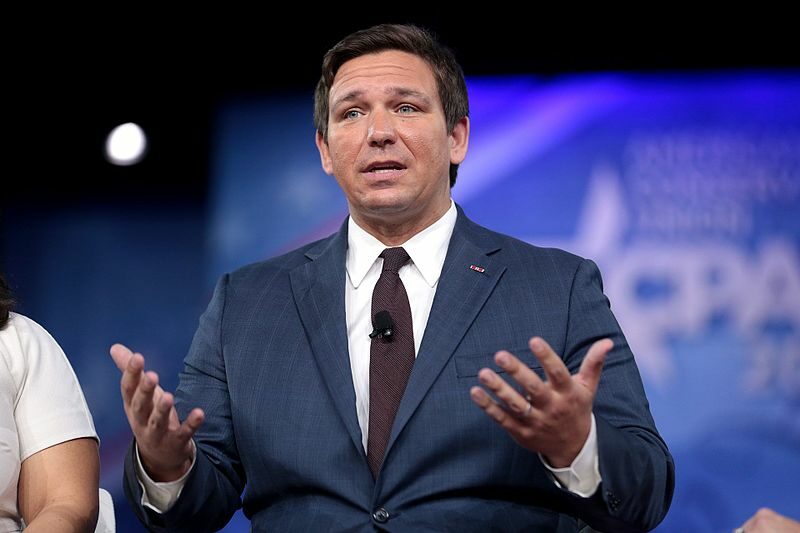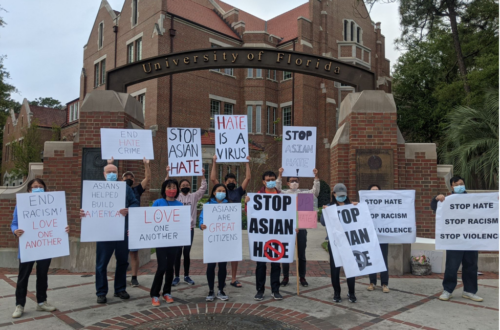Not long ago a campus petitioner stopped me and asked for my support to end voter fraud in Florida.
He was a young man like myself who could even pass for a student were he not holding a clipboard with a stack of papers pressed against his chest. He pulled out a sheet and handed it to me.
The proposal sounded innocuous — you want real ballots in every election — so I questioned him further and he quickly said, “you don’t need real identification to vote, so this would only allow people with a state ID or driver’s license to cast a ballot.”
Not true. Unless you’re voting through a provisional ballot, Florida elections mandate proof of identity with photo IDs. While Florida requirements are not as strict as other states that limit photo ID options, the consequences of these methods have resulted in lower voter turnouts among minorities.
We have also seen ‘voter fraud’ being used as a political weapon.
In the last two years, Donald Trump claimed voter fraud in both the national election and pivotal elections in the state of Florida — Senators Rick Scott and Marco Rubio publicly agreed. Without evidence, these assertions promote distrust for the political process at a time when Democrats are looking toward voter expansion. When Senate Majority Leader Mitch McConnell was asked about House bill H.R. 1 this January, legislation to make Election day a federal holiday, he declared it a ‘power grab’ by the Democratic party.
”We can do so much more:”
This made me think about the passage of Amendment Four last November. The constitutional amendment proposed restoring the voting rights of people with prior felony convictions, upon completing parole and probation, but exempting those convicted of murder or charged with a sexual offense felony.
In total, one-tenth of the state’s voting population was restored, a historic 1.4 million people. It also occurred exactly 150 years since 1868, the year when the provision of criminal disenfranchisement first became law. Amendment Four was a triumph over this anniversary and the blighted history civil suppression in the state of Florida.
If we look at the history, the felon disenfranchisement clause was inherited from the Florida Constitution of 1868. In this document of Southern Reconstruction politics, racial prejudice from the era of slavery lingered like an acrid odor within the codified language of judicial power. At first, nearly half of Florida’s population was black by the end of the Civil War, and Civil War Amendments resulted in the Florida’s first black elected officials.
According to University of South Florida Professor Emeritus of Government Darryl Paulson, “Nineteen blacks were elected to the 76-member Florida Legislature and Josiah Wells, a former slave and Union soldier from Alachua County, became Florida’s first black member of Congress when he won election in 1870”; however, “Wells would also be the only black member of Congress from Florida for the next 116 years.” In Dr. Paulson’s six-part article on the history of black voting in Florida, he notes that the “explosion in the number of black voters and black elected officials” was countered by Jim Crow legislation and racist Black Codes that would criminalize black lives.
Before Amendment Four, only Florida, Iowa, Kentucky, and Virginia permanently banned felons from regaining their civil liberties. However, Florida rates of incarceration are unique because they are some of the highest in the nation. Today the state is littered with 143 individual correctional facilities scattered from the panhandle to Monroe County.
“Take action on climate change. Defend individual liberties with fair-minded judges.”
Comparable to the U.S. prison system at large, African-Americans are disproportionately overrepresented in the state of Florida — the black population makes up 16% of the state yet nearly half of the prison population. Because of the state’s disenfranchisement provision, an astronomical 1 in 5 black men and women could not cast a ballot before 2018.
What brings this landmark piece of legislation, which passed with over 64 percent approval, into question is that it is yet to be enacted. There is also a general concern that its fate lies in the hands of the bill’s first opponents.
Florida Governor Ron DeSantis postponed signing into law the ‘Voting Rights Restoration for Felons Initiative’ stating, in an interview with the Palm Beach Post, that the ballot amendment should be reviewed by Florida Legislature first for “implementing language.”
In order to understand the fear of potential injustice, we must speak honestly about the ways that Florida politicians have obstructed, in the recent past, the reintegration of Florida felons into civil society.
“Those who hoped to have their voting rights restored were required to plead their case to the state’s Executive Clemency Board — a panel made up of the governor and his Cabinet,” according to a The Hill report. This panel is now remembered for the mercilessness it upheld before thousands of individual atonements.
In 2007, Gov. Charlie Crist was criticized by the GOP for being weak on crime when he made it easier for felons to regain their voting rights. The move was significant and impacted voter turnouts during Barack Obama’s presidential run in Florida.
“But none of these ambitions are possible without the bedrock guarantee of our right to vote”
However, former Gov. Rick Scott reversed the ruling in 2011. For the next seven years, the Clemency board was widely criticized as arbitrary and riddled with racial discrimination and political bias. It was eventually sued for racial animus and deemed “fatally flawed” by District Judge Mark Walker in Tallahassee at the end of Scott’s tenure.
Yet the damage was done. During Christ’s four years as governor, more than 150,000 Floridians had their voting rights restored, [but] over the next seven years, Gov. Rick Scott restored voting rights to only about 3,000 people,” according to NPR.
This was the result of a five-year mandatory waiting period post-release, a backlog of more than 10,000 applicants, a board that only met four times a year, and baseless standards for civil restoration.
“Scott restored the voting rights of twice as many whites as blacks and three times as many white men as black men,” according to an report by the Palm Beach Post.
“Black men accounted for 16 percent of voting restorations even though 38 percent of released prisoners were black men. Blacks accounted for a lower percentage of restorations under Scott than under any of his predecessors, Republican or Democrat, going back at least half a century.”
Ironically, racial discrimination was not ‘sufficiently proven’ when the Brennan Center for Justice sued Governor Bush and other members of the Clemency Board in 2002. Foresight over the future mishandling of the Clemency Board was overlooked.
In the legal summary of Johnson v Bush, the United States Court of Appeals for the Eleventh Circuit upheld criminal disenfranchisement on the basis that “there is no allegation of racial discrimination in 1968 when legislators decided to include a felon disenfranchisement provision in the revised constitution.”
“Let’s be clear: voter suppression is real.”
How can we relegate honest discussions about racism to the era of slavery, or to the decades of the Civil Rights Movement, when these moments clearly strike at the core of political repression? Until we can confront, earnestly, the lasting echoes of flaws from early-American democracy there will always be hypocrisy within democratic structures.
As Amendment Four awaits a signature, it will first be battled within Florida’s Republican-majority State Legislature, a majority that has never changed since 1995. Since those years, key elections have come down to the thousands of votes.
2000: Republican President Bush wins by 537 votes
2002: Republican Governor Jeb Bush wins by 655,418 votes
2004: Republican President Bush re-election wins 380,978 votes
2006: Republican Governor Charlie Crist wins by 341,556 votes
2010: Republican Governor Rick Scott wins by 61,550 votes
2014: Republican Governor Scott re-election wins by 64,145 votes
2016: Republican President Donald Trump wins by 112,911 votes
2018: Republican Senator Rick Scott wins by 10,033 votes
2018: Republican Governor Ron DeSantis wins by 32,463 votes
It is important to not get bogged down by these figures of the past, although they do illustrate a trend. For a battleground state, elections have been fairly one-sided. The restoration of over a million votes may finally tip a few scales in the upcoming years.
“From making it harder to register and stay on the rolls to moving and closing polling places to rejecting lawful ballots, we can no longer ignore these threats to democracy.”
— Stacey Abrams, Rebuttal to President Trump’s 2019 State of the Union
I remember the campaign initiative for felon restoration coming to my campus. I signed on the page. Each one added to a movement that began a decade before when Desmond Meade struggled to elevate the issue of voting rights to the ballot. Meade had battled homelessness, served imprisonment, then earned a law degree, to later lead a coalition that would amend a shameful 150 year old legacy.
The legislators will meet on March 5 and confront this legacy themselves. I am left with an uncanny feeling about the potential change that signing a ballot initiative can provoke.
Ron DeSantis speaking at CPAC in 2017. (Unmodified Creative Commons photo by Gage Skidmore. bit.ly/1jxQJMa)





